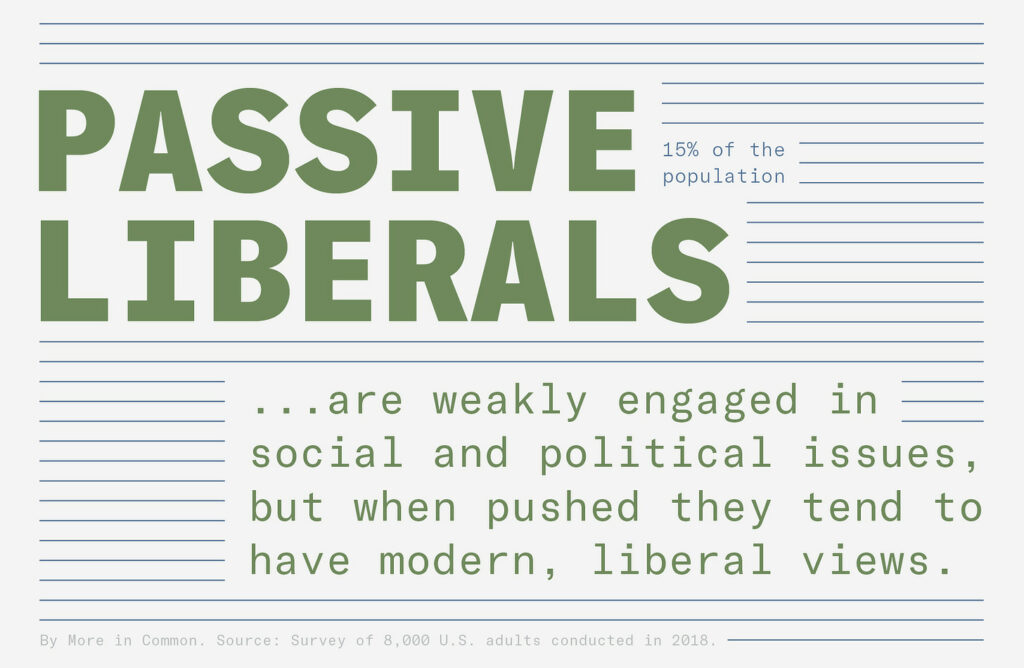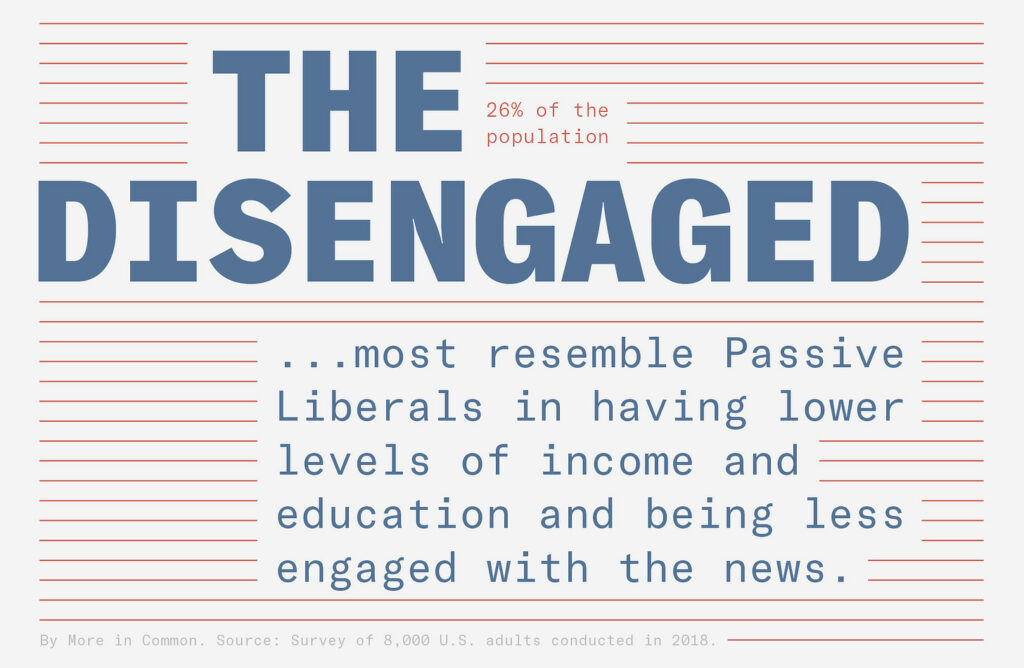August 4, 2022
Meet Linda and Lucille
More in Common US
Summary: Passive Liberals and the Disengaged both feel discouraged from participating in politics. Getting to know these segments better can help us understand why.
In our foundational 2018 segmentation study, we found that, instead of being divided 50-50 between two opposing political groups, American society consists of seven distinct groups of people—seven “hidden tribes.” Of these tribes, two feel particularly discouraged from participating in politics: Passive Liberals, and the Disengaged. Bringing these segments into political and civic space would likely help reduce polarization. Given this, let’s revisit these segments to better understand how to engage them in democracy.
Who are they?

Passive Liberals (15% of the population) are weakly engaged in social and political issues, but when pushed they tend to have modern, liberal views. They are younger and have a higher proportion of women (59%) than any other segment. Unlike other liberal groups, they tend to feel isolated from their communities and the system at large. They consume little news media, and generally avoid political debate, partly from a general aversion to argumentation and partly because they feel that they do not know much about social and political issues. Main concerns: Healthcare, racism, and poverty

The Politically Disengaged (26% of the population) most resemble Passive Liberals in having lower levels of income and education and being less engaged with the news. 41 percent are making less than $30,000 per year, and approximately one in four have gone without enough food or without medical treatment at least somewhat often. They are more anxious about external threats and less open in their attitudes towards differences than Passive Liberals are. They are practically invisible in local politics and community life, as they are the least likely to vote or attend political meetings. Main concerns: Gun violence, the economy, terrorism
Meet Linda and Lucille, two members of our 2022 online panel
Linda (age 55-64, white, from Texas) is a Passive Liberal.
- She is liberal-leaning, middle income, and holds a college degree but does not vote regularly. She follows news “most of the time” but thinks that politicians don’t care about her, and the government is rigged to serve the rich. She faces severe economic hardship due to inflation.
- Linda trusts independent fact checkers and established news organizations to get information about elections. She does not trust conservative media or Trump.
- Most concerning threat in America: “Anti-government violent extremism in the US. Overthrowing our government… is a real possibility if people believe or follow Republicans and Trump. We are at risk.”
Lucille (age 65+, Black, from Mississippi) is Disengaged.
- She is a low-income resident of a rural area, a grandmother, and somewhat liberal. She follows news “some of the time” and rarely votes, attends protests or shares political content online. At times, she feels unsafe in her own home and goes without necessary medication.
- Lucille trusts independent fact checkers, established news organizations, and state election officials to get information about elections. She doesn’t trust politicians from either political party.
- Most concerning threat in America: “I have a concern about the rules for health care. We have no control over what can be charged for services. Even though we have health care, we still have a lot of out-of-pocket expenses that we cannot afford.”
Recommendations
👉 A study by the Knight Foundation found that Americans who rarely vote say that they ① don’t like the candidates, ② don’t know the candidates and issues, or ③ they feel like their vote doesn’t matter. Given our understanding of Passive Liberals and the Disengaged, these reasons make sense. However, engaging with people who don’t think their vote matters is critical to strengthening our democracy. Instead of judging someone who doesn’t want to vote, we should hear them out, speak to their concerns, find common ground, and emphasize a shared commitment to making our democracy one where all Americans’ voices are heard. To find more recommendations for having conversations with people who don’t regularly vote, see our conversation guide here.
👉 Focus on the long-term engagement, not one-off emails. Passive Liberals and the Politically Disengaged are more likely to feel that they do not know enough to participate in civic life, and they do not belong in politics. Addressing these concerns takes time and authentic relationship building. Transactional engagement has the potential to further alienate members of these tribes.